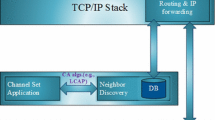Abstract
Providing effective medium access for wireless networks is a challenging task. Most of the existing protocols of IEEE 802.11 Medium Access Control (MAC) work towards the goal of achieving effective channel access by developing various backoff procedures. In this paper, we make an attempt to develop a new medium access protocol named Learning Automata (LA) based Wireless Channel Reservation (LAWCR). We use an LA approach to implement reservation for channel access for single hop wireless networks. Also, sequence procedure is used to improve the reservation mechanism. The performance of the proposed LAWCR scheme show significant improvements over the legacy DCF protocol with respect to important criteria such as the average time spent in the buffer and the throughput.
Similar content being viewed by others
References
Kleinrock L., & Tobagi F. A. (1975) Packet switching in radio channels: Part I—carrier sense multiple access modes and their throughput-delay characteristics. IEEE Transactions on Communications COM-23(12): 1400–1416
Fitzek F., Kopsel A., Wolisz A., Krishnam M., Reisslein M. (2002) Providing application-level QoS in 3G/4G wireless systems: A comprehensive framework based on multirate CDMA. IEEE Wireless Communications 9(2): 42–47
Pattara-Atikom W., Murthy P. K., Banarjee S. (2003) Distributed mechanisms for quality of service (QoS) in wireless LANs. IEEE Wireless Communications 10(3): 26–34
Marques V., Aguiar R. L., Garcia C., Moreno J. I., Beaujeam C., Melin E. et al (2003) An IP based QoS architecture for 4G operator scenarios. IEEE Wireless Communications 10(3): 54–62
Mangold S., Choi S., Hiertz G. R., Klein O., Walke B. (2003) Analysis of IEEE 802.11e for QoS support in wireless LANs. IEEE Wireless Communications 10(6): 40–50
Zhu, H., Li, M., Chlamtac, I., & Prabhakaran, B. (2004). A survey of quality of service in IEEE 802.11 networks. IEEE Wireless Communications, 6–14.
Schiller J. (2001) Mobile communications. Pearson Education Limited, Boston
Vaidya N., Gupta S., Bahl P. (2005) Distributed fair scheduling in wireless LAN. IEEE Transactions on Mobile Computing 4(6): 616–628
Karn, P. (1990). MACA—a new channel access method for packet radio. In: Proceedings of 9th ARRL Computer Networking Conference (pp. 134–140).
Krishna P. V., Iyengar N. C. S. N (2008) Sequencing technique: An enhancement to 802.11 medium access control to improve the performance of wireless networks. International Journal of Communication and Distributed Systems 1(1): 52–70
Krishna, P. V. (2008). A study of quality of service metrics for wireless systems. Ph. D. Thesis. VIT University, Vellore.
Krishna P. V., Iyengar N. C. S. N. (2008) Design of sequencing medium access control to improve the performance of wireless networks. Journal of Computing and Information Technology, CIT 16(2): 1–9. doi:10.2498/cit.1001007
Choi J., Yoo J., Choi S., Kim C. (2005) EBA: An enhancement of the IEEE 802.11 DCF via distributed reservation. IEEE Transactions on Mobile Computing 4(4): 378–390
Bianchi, G., Fratta, L., & Oliveri M. (1996). Performance evaluation and enhancement of the CSMA/CA MAC protocol for 802.11 wireless LANs. In Proceedings of the PIMRC (pp. 392–396). Taipei, Taiwan, October.
Calì F., Conti M., Gregori E. (2000) IEEE 802.11 protocol: Design and performance evaluation of an adaptive backoff mechanism. IEEE Journal on Selected Areas in Communications 18(9): 1774–1786
Narendra K. S., Thathachar M. A. L. (1989) Learning automata. Prentice-Hall, Englewood Cliffs
Ünsal, C. (1997). Stochastic learning automata. In Intelligent navigation of autonomous vehicles in an automated highway system: Learning methods and interacting vehicles approach, chapter 3. Virginia Tech, USA.
Misra S., Tiwari V., Obaidat M. S. (2009) LACAS: Learning automata-based congestion avoidance scheme for healthcare wireless sensor networks. IEEE Journal on Selected Areas in Communications 27(4): 466–479
Oommen, B. J., & Misra, S. A. (2009). Fault-tolerant routing algorithm for mobile ad hoc networks using a stochastic learning-based weak estimation procedure for non-stationary environments. In Telecommunication systems. Berlin: Springer (in press).
Misra S., Oommen B. J. (2009) An efficient pursuit automata approach for estimating stable all—pairs shortest paths in stochastic network environments. International Journal of Communication Systems 22: 441–468
Misra S., Oommen B. J. (2006) An efficient dynamic algorithm for maintaining all-pairs shortest paths in stochastic networks. IEEE Transactions on Computers 55(6): 686–702
Misra S., Oommen B. J. (2005) Dynamic algorithms for the shortest path routing problem: Learning automata-based solutions. IEEE Transactions on Systems, Man, and Cybernetics, Part B 35(6): 1179–1192
Misra S., Oommen B. J. (2004) GPSPA: A new adaptive algorithm for maintaining shortest path routing trees in stochastic networks. International Journal of Communication Systems 17(10): 963–984
Misra S., Abraham K. I., Obaidat M. S., Krishna P. V. (2009) LAID: A learning automata-based approach for intrusion detection in wireless sensor networks. Security and Communication Networks 2(2): 215–224
Oommen B. J., Misra S. (2009) Handbook of automation. In: Shimon N. (eds) Cybernetics and learning automata (Chapter 12, pp. 291–232). Springer, Berlin
Author information
Authors and Affiliations
Corresponding author
Rights and permissions
About this article
Cite this article
Misra, S., Krishna, P.V. & Abraham, K.I. An Adaptive Learning Scheme for Medium Access with Channel Reservation in Wireless Networks. Wireless Pers Commun 56, 55–72 (2011). https://doi.org/10.1007/s11277-009-9883-0
Published:
Issue Date:
DOI: https://doi.org/10.1007/s11277-009-9883-0




